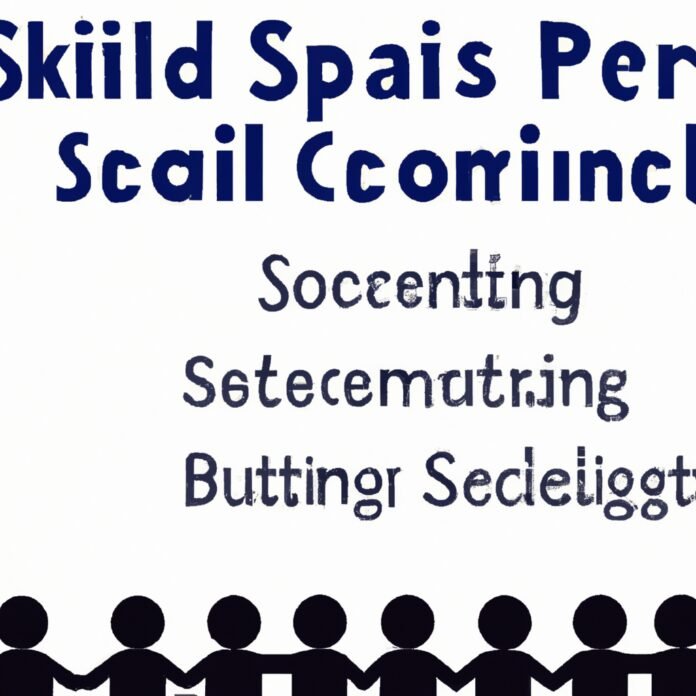Making friends and finding your place in social groups is an important part of growing up, and something that we all have to learn. Building social skills in children is essential for helping them to develop positive peer interactions and strong relationships. In this article, we’ll explore the different ways you can encourage your child to build up their social skills and foster healthy friendships.
1. Enhancing Human Connection: Fostering Positive Social Relationships in Kids
From birth, humans come wired to connect. Positive social relationships are essential for kids’ psychological, behavioral and developmental health – not to mention joy! Here are a few tips for fostering positive social relationships in kids:
- Help them understand mutual respect and emotional safety: Kids should understand that their relationships should be fair, honest and respectful. Teaching them to respect principle, feelings and emotions of one another by having honest and open conversations is the key.
- Engage in family activities: Involve your family in activities that bring each member together to make memories and laugh together. This will encourage your kids to form social relationships with other family members, while developing their communication and problem-solving skills.
- Introduce positive experiences: Help them identify individuals who share something in common, like playing team sports or participating in a club or other activities. Provide a safe and positive environment for these activities.
- Teach your kids to be kind and empathetic: Kindness and empathy are essential to positive relationships. Encourage meaningful conversations, give them opportunities to help others, and help them to recognize their feelings.
Having a strong network of social relationships is an important part of growing up, and can be a rewarding and fulfilling experience for your child. As a parent, it’s important to encourage positive relationships with peers, family members and others to help your child reach their full potential.
2. Rewarding Meaningful Interactions: Creating Incentives for Positive Behaviors
- Institute Positive Feedback Encouragement – Like anything else in life, lasting change requires constructive feedback and celebration of success. Establish channels for reputation building and meaningful rewards tailored to everyday efforts that can constitute discussions or positive interactions. This could be as simple as awarding badges to members that are active contributors, or something as detailed as tiered bonus systems based on individual achievements.
- Create Conflict Resolution Methods – Not every exchange will be harmonious, but worth emphasizing participation in how to resolve disagreeable discussion points or creating ground rules on how best to address contentious topics. Keeping accurate records of person’s input will help remind everyone to approach conversations with respect.
- Establish Clear Goals – Formulate parameters on the usage and application of online activities within a community setting. Ultimately, this serves as metrics to measure progress when it comes to members being positive contributors or understanding each other better as a result of interaction.
Enabling members to recognize the indication and contribution of impactful conversations will encourage positive behavior in a community. A team approach decides on working together toward a common goal, and reinforces the idea that the overall health of the community reflects on all individuals.
As the community grows in size, it is important to continue advocating for open dialogues and processes that support collaboration. Tracking and rewarding meaningful interactions will keep relationships rooted in mutual awareness and understanding. With the right strategies in place, there is no limit to what kind of meaningful content or action can be achieved.
3. Generating Social Success: Boosting Self-Confidence through Peer Interactions
At the heart of any successful social interaction is self-confidence. The laughter, laughter-filled conversations, and even the meaningful moments shared between peers depend heavily on how positively we think of ourselves. This section will explore the ways in which social success can be generated by boosting self-confidence through peer interactions.
The concept of self-confidence is not an easy one for many people. Negative thoughts regarding one’s abilities or self-worth can be deeply rooted, making it difficult to form any kind of positive outlook. This is why it is important to focus on the activities that promote a balanced and positive perspective of oneself through peer interactions. Participation in activities such as group outings, sports, social gatherings, and other collaborative networks can help to build more positive self-confidence and open the door to further social success.
Here are some tips to help boost self-confidence when engaging in peer interactions:
- Be prepared – make sure you have a solid understanding of the topic before engaging in conversation.
- Be open – maintain an open soul, be kind, and let yourself explore the possibilities.
- Listen – hear others out and listen without judgement.
- Help – think of ways you can help others and offer support when needed.
By being mindful and engaging in activities that promote self-confidence through peer interaction, social success can be achieved. The skillsets acquired during such activities can help to build upon a person’s existing strengths and create new ones. By staying focused on personal growth, the journey of self-discovery may just bring some unexpected rewards.
4. Increasing Positive Outcomes: Developing Long-Lasting Friendships
The pathway to positive outcomes in life often begins with the quality of our relationships. In order to create lasting positive benefits, it is essential to develop a positive connection with others. Making strong, supportive friendships can help us become more secure in our relationships and gain the confidence to better handle changes and stressful situations.
Building Meaningful Connections
To build meaningful connections, it is important to be honest and vulnerable. Expressing your thoughts and feelings openly can help build trust. Honesty fosters constructive dialogue and increases understanding. Additionally, when we reveal deeper parts of ourselves, we are more likely to make strong and lasting relationships.
Creating Lasting Impacts
Taking the time to understand someone’s perspective gives a deeper perspective of who they are. Additionally, spending time with those who value our friendship paves the way to contribute to each other’s growth and development. Listening and actively engaging with one another can help create a lasting and meaningful bond.
Finally, taking small steps in developing meaningful relationships can lead to long-term benefits. Here are some tips to help:
- Bond over shared values and interests.
- Be mindful of not being critical.
- Be open to experiences that promote a sense of understanding.
- Be generous with your support.
- Spend time together to strengthen the connection.
These suggestions can help you create positive, meaningful relationships that promote positivity and growth.
5. Cultivating Connections: Nurturing Strong Social Skills in Children
Social skills are incredibly important for children. After all, it’s through developing good relationships with peers, teachers, and family that children develop and grow. The trick is in teaching children how to cultivate meaningful connections with others. Here are five ideas on how to foster strong social skills within your children:
- Provide Play Opportunities – By providing opportunities for your children to interact with peers in settings like outdoor playgroups or daycare centers, you help them to develop and nurture lasting relationships.
- Encourage Open Communication – Let your kids know that you are available to discuss anything they’d like to talk about and demonstrate an understanding of their concerns. Create a home environment that’s conducive to honest, open, and respectful dialogue.
- Teach Conflict Resolution – Conflicts are an inevitable part of any relationship. Teach your children how to resolve conflicts in healthy, productive ways. Emphasize that even when having difficulty with someone, it’s possible to talk the issue out and resolve the conflict.
- Model Proper Etiquette – Help your children learn the basics of good etiquette, such as introductions, table manners, and how to be respectful of other people’s things. Demonstrating proper etiquette yourself is a great way to start!
- Promote Positive Behaviour – Never underestimate the power of positive reinforcement to shape behaviour. Reinforce positive behaviour with verbal praise or rewards to encourage healthy social engagement.
No matter what the age of your child, you, the parent, can play an important role in modeling and teaching positive social behaviour. Consistently guiding your child and reinforcing good behaviour can make a profound difference in the quality and depth of your child’s connections with other people.
The more children are encouraged to practice and develop their social skills, the more they can develop positive relationships with their peers. Empowering children to be socially adept will help build their sense of self-confidence and lay the foundation for a strong social network. With the right encouragement and guidance, children can be more than capable of building and maintaining social relationships with their peers and make the most out of their growing years.

